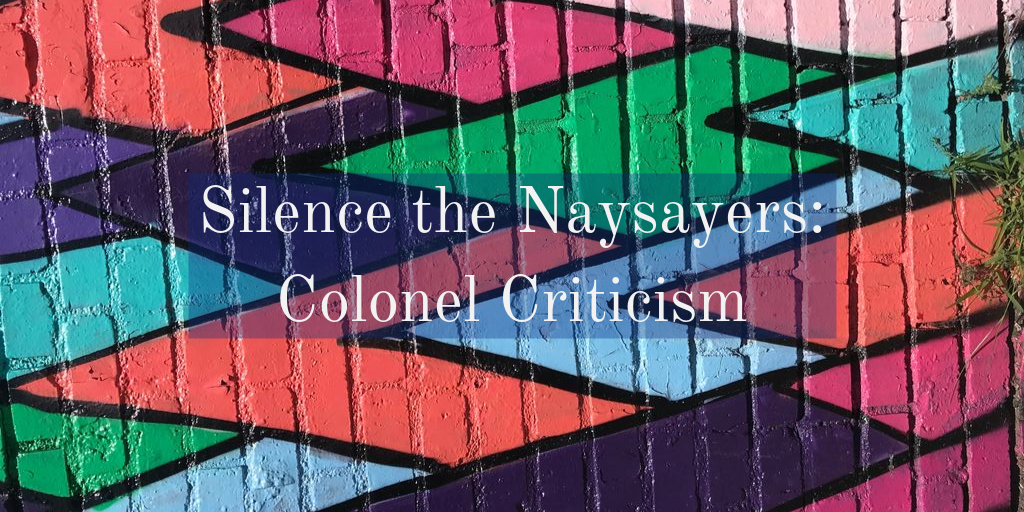
Silence the Naysayers: Colonel Criticism
Often disguising himself as “constructive input,” Colonel Criticism rushes in with his long, condescending finger ready to point out every perceived problem with your fledgling creative work. He looks for every opportunity to discount or discredit your work on the basis of some perceived flaw or error.
A stickler for rules and regulations, the Colonel is intolerant of even the slightest deviation from standard procedure. Colonel Criticism throws the baby out with the bathwater, using any mistake or deviation from the "norm" as an opportunity to flush your creative dreams.
More...
Any fool can criticize.
It is easy to stand on the sidelines of someone else's creative work and find negative things to say - anyone can do that. Criticism does not take any special skill or talent.
The voice of Colonel Criticism in our own heads can speak as loudly and condescendingly as any other person's feedback and we have to be vigilant to guard our minds against the accusations of this enemy.
Like Comparison, the Colonel's 
Find better feedback.
You get to choose which thoughts live in your mind. Your mind is vital to your creativity and you need to be proactive to protect your thoughts.
Surround Yourself with Critique
The Colonel has a cousin named Critique who is essential to the creative process. You can differentiate them by their feedback - the Colonel can only see shortcomings, while Critique points out areas for growth while highlighting your strengths and utilizing them to make you stronger.
Critique is a powerful skill, honed and sharpened through time, wisdom, and experience, to identify areas in need of work and empower future change and growth.
A hallmark of Critique is that it highlights areas where you need to grow and gives you a path toward change. A good Critique will leave you with work to do, but will never leave you hopeless.
The best Critiquers are very experienced in the creative expression that you are pursuing and know many tools and resources to help you grow. They can partner with you to begin creating with excellence.
Find the Appropriate Time
Keep in mind, with both Criticism and Critique, there is an appropriate time to pursue input in your work. Criticism tries to cut you off at the start, in the ideating phase when you're just beginning to explore your ideas and creative expression. Critique has the wisdom to let you try and experiment. Critique comes in when you reach the stage of knowing which direction to pursue and beginning to refine your ideas.
Our ultimate goal is excellence, whatever our chosen creative expression may be. Excellence allows us to have a journey from beginning to end, always with the goal of continual improvement and doing the best we can with the tools that we have at the time.
"Excellence allows us to have a journey from beginning to end, always with the goal of continual improvement and doing the best we can with the tools that we have at the time." @brightideasco
How To Give Good Critiques
The more you learn and grow, the more you will be able to offer valuable critiques to others yourself. Unless you have experience in the creative expression that the other person is trying to explore, you probably shouldn't offer critiques or criticisms.
My friend Sarah (the other OG Bright Ideas Girl) loves ballroom dance, and I've never done it before. I wouldn't dream of critiquing her technique or skills. Her teacher, or fellow experienced dancers, however, have the experience to offer a valid path forward to growth and change. I can offer ideas and suggestions that may or may not be relevant, but I don't have authority to critique or criticize.
Grow in Authority
"It is not the critic who counts; not the man who points out how the strong man stumbles, or where the doer of deeds could have done them better. The credit belongs to the man who is actually in the arena, whose face is marred by dust and sweat and blood; who strives valiantly; who errs, who comes short again and again, because there is no effort without error and shortcoming; but who does actually strive to do the deeds; who knows great enthusiasms, the great devotions; who spends himself in a worthy cause; who at the best knows in the end the triumph of high achievement, and who at the worst, if he fails, at least fails while daring greatly, so that his place shall never be with those cold and timid souls who neither know victory nor defeat." Theodore Roosevelt
It is only through trying many paths, or blazing your own trail that you learn to show others the way. Authority comes from doing the work. Get into the arena. Try things. Fail, learn, grow, continue forward. This is the path to authority and honing your ability to offer meaningful critiques.
A Good Critique Offers:
- A feeling of empowerment in their work
- A path toward growth and excellence
- Increased vision for their creative expression
- Refined tools and techniques
- Renewed energy in their work
10 Tips for 10 Days
I participated in a LinkedIn challenge called 10 Tips for 10 Days and recorded ten quick videos on a variety of topics, including Colonel Criticism & Critique.
Actions
"Any food can criticize, it takes wisdom and skill to offer meaningful critique." @brightideasco #brightideas
Learn More about Criticism & Critique
Bright Ideas: Light Up Your Creativity. If you'd like to learn more about Critique, Colonel Criticism, the rest of the naysayers, and expressing your creativity, grab a copy of our book, Bright Ideas: Light Up Your Creativity from our shop or Amazon.

